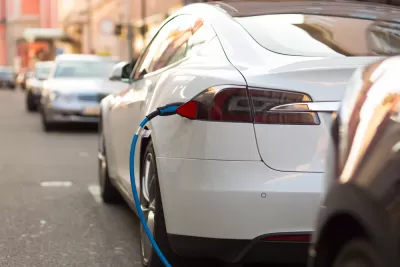A new Union of Concerned Scientists report shows that due to considerable gains made in cleaning the electric grid and in producing electric vehicles more efficiently, EVs are the environmentally sensible choice.

The UCS report, "Cleaner Cars from Cradle to Grave (2015)," considers three variables in its evaluation of lifecycle carbon emissions that includes "vehicle production, operation, and disposal":
- Regional electricity grids across the United States based on the global warming emissions produced from electricity generation,
- Emissions generated by charging an EV,
- Emissions produced by gasoline-powered vehicles.
"Two-thirds of all Americans now live in areas where driving an EV produces fewer climate emissions than almost all comparable gasoline and gasoline hybrid cars—a fact attributable to more efficient EVs and an increasingly clean electricity grid," states the introduction to the report.
The 2012 "State of Charge"report [PDF] is posted here.
To see the fuel efficiency necessary to match that of an EV, find your region on the map below:

Credit: UCS blog: How to Calculate Electric Vehicle Emissions by ZIP Code and Model
The lowest fuel efficiency on the map is in Kansas with 35 mpg. The average fuel efficiency for a new passenger car in the United States is 36 mpg; for a light truck, it's 25.3 mpg, according to the Department of Transportation.
The utilities move away from coal to natural gas and renewables played a critical role in making electric vehicles cleaner. Coal-powered electricity "emits between 1.4 and 3.6 pounds of carbon dioxide equivalent per kilowatt hour (lb. CO2e/kWh)," writes USC policy analyst Josh Goldman, policy analyst. "Natural gas, by comparison, emits between 0.6 and 2 lb. CO2e/kWh."
The report accounts for the fact that "BEV [battery electric vehicle] production results in higher emissions than the making of gasoline cars—mostly due to the materials and fabrication of the BEV lithium-ion battery," writes Rachael Nealer in her UCS blog.
For an interesting read on the new report, please see David Roberts' piece in Vox.
A June CityLab article based on a working paper from the National Bureau of Economic Research presents a contrary viewpoint (posted here). The report also considers criteria pollutants and rebates given to EVs.
Hat tip: Paul Scott, EVs and Energy
FULL STORY: UCS report: Cleaner Cars from Cradle to Grave (2015)

Alabama: Trump Terminates Settlements for Black Communities Harmed By Raw Sewage
Trump deemed the landmark civil rights agreement “illegal DEI and environmental justice policy.”

Study: Maui’s Plan to Convert Vacation Rentals to Long-Term Housing Could Cause Nearly $1 Billion Economic Loss
The plan would reduce visitor accommodation by 25% resulting in 1,900 jobs lost.

Planetizen Federal Action Tracker
A weekly monitor of how Trump’s orders and actions are impacting planners and planning in America.

Wind Energy on the Rise Despite Federal Policy Reversal
The Trump administration is revoking federal support for renewable energy, but demand for new projects continues unabated.

Passengers Flock to Caltrain After Electrification
The new electric trains are running faster and more reliably, leading to strong ridership growth on the Bay Area rail system.

Texas Churches Rally Behind ‘Yes in God’s Back Yard’ Legislation
Religious leaders want the state to reduce zoning regulations to streamline leasing church-owned land to housing developers.
Urban Design for Planners 1: Software Tools
This six-course series explores essential urban design concepts using open source software and equips planners with the tools they need to participate fully in the urban design process.
Planning for Universal Design
Learn the tools for implementing Universal Design in planning regulations.
Caltrans
Smith Gee Studio
Institute for Housing and Urban Development Studies (IHS)
City of Grandview
Harvard GSD Executive Education
Toledo-Lucas County Plan Commissions
Salt Lake City
NYU Wagner Graduate School of Public Service




























